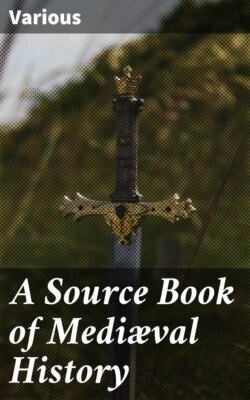Читать книгу A Source Book of Mediæval History - Various - Страница 32
На сайте Литреса книга снята с продажи.
14. Pepin the Short Takes the Title of King (751)
ОглавлениеDuring the seventh and eighth centuries the Merovingian line of Frankish kings degenerated to a condition of weakness both pitiable and ridiculous. As the royal family became less worthy, the powers of government gradually slipped from its hands into those of a series of ministers commonly known by the title of Mayor of the Palace (Maior Domus). The most illustrious of these uncrowned sovereigns was Charles Martel, the victor over the Saracens near Poitiers, in whose time the Frankish throne for four years had no occupant at all. Martel contrived to make his peculiar office hereditary, and at his death in 741 left it to be filled jointly by his two elder sons, Karlmann and Pepin the Short. They decided that it would be to their interest to keep up the show of Merovingian royalty a little longer and in 743 allowed Childeric III. to mount the throne—a weakling destined to be the last of his family to wear the Frankish crown. Four years later Karlmann renounced his office and withdrew to the monastery of Monte Cassino, southeast of Rome, leaving Pepin sole "mayor" and the only real ruler of the Franks. Before many more years had passed, the utter uselessness of keeping up a royal line whose members were notoriously unfit to govern had impressed itself upon the nation to such an extent that when Pepin proceeded to put young Childeric in a monastery and take the title of king for himself, nobody offered the slightest objection. The sanction of the Pope was obtained for the act because Pepin thought that his course would thus be made to appear less like an outright usurpation. The Pope's reward came four years later when Pepin bestowed upon him the lands in northern and central Italy which eventually constituted, in the main, the so-called States of the Church. In later times, after the reign of Pepin's famous son Charlemagne, the new dynasty established by Pepin's elevation to the throne came to be known as the Carolingian (from Karolus, or Charles).
The following account of the change from the Merovingian to the Carolingian line is taken from the so-called Lesser Annals of Lorsch. At the monastery of Lorsch, as at nearly every other such place in the Middle Ages, records or "annals" of one sort or another were pretty regularly kept. They were often very inaccurate and their writers had a curious way of filling up space with matters of little importance, but sometimes, as in the present instance, we can get from them some very interesting information. The monastery of Lorsch was about twelve miles distant from Heidelberg, in southern Germany.
Source—Annales Laurissenses Minores ["Lesser Annals of Lorsch"]. Text in Monumenta Germaniæ Historica, Scriptores (Pertz ed.), Vol. I., p. 116.
In the year 750[115] of the Lord's incarnation Pepin sent ambassadors to Rome to Pope Zacharias,[116] to inquire concerning the kings of the Franks who, though they were of the royal line and were called kings, had no power in the kingdom, except that charters and privileges were drawn up in their names. They had absolutely no kingly authority, but did whatever the Major Domus of the Franks desired.[117] But on the first day of March in the Campus Martius,[118] according to ancient custom, gifts were offered to these kings by the people, and the king himself sat in the royal seat with the army standing round him and the Major Domus in his presence, and he commanded on that day whatever was decreed by the Franks; but on all other days thenceforward he remained quietly at home. Pope Zacharias, therefore, in the exercise of his apostolic authority, replied to their inquiry that it seemed to him better and more expedient that the man who held power in the kingdom should be called king and be king, rather than he who falsely bore that name. Therefore the aforesaid pope commanded the king and people of the Franks that Pepin, who was exercising royal power, should be called king, and should be established on the throne. This was therefore done by the anointing of the holy archbishop Boniface in the city of Soissons. Pepin was proclaimed king, and Childeric, who was falsely called king, was shaved and sent into a monastery.
